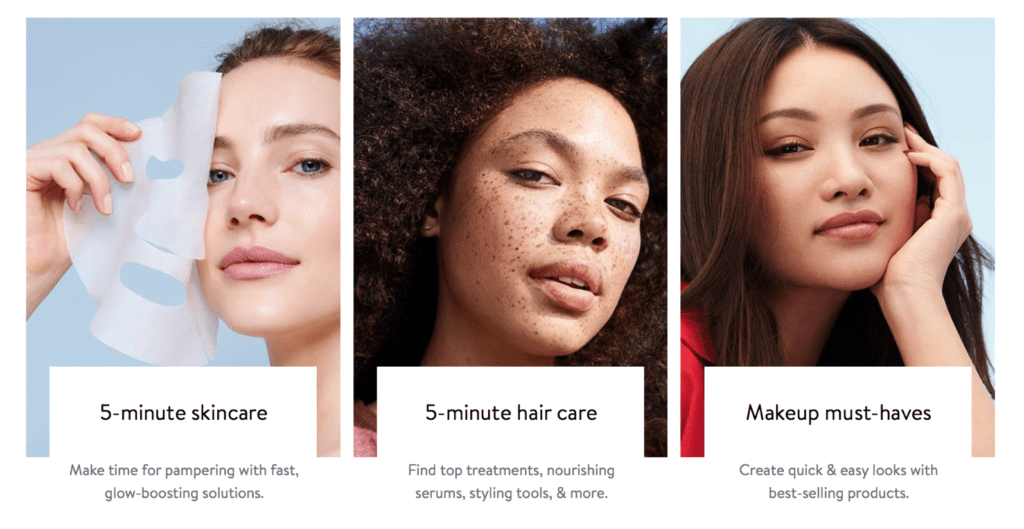An aisle in one of Walmart’s expansive Southern California outposts is packed with a sweeping array of tropical-scented body washes, colorful hairbrushes, and selection of scrunchies. There are hair dyes in hues ranging from neutral browns to striking blondes, and a seemingly countless number of bottles of styling sprays and gels. Among the shelves in that same aisle is a collection of various cosmetics, and skincare haircare products that are locked inside a glass case.
In order to access and purchase those products, store-goers need assistance from a Walmart employee. After a customer makes his/her selection from the locked case, “a Walmart employee walks the items to the front of the store to be held until they are purchased,” Jasmine Saunders told NBC of her recent trip to a Walmart store in Riverside, California.
What do the products inside the locked case have in common? It is not that they are electronics, or that they are any more expensive than the other products displayed in the same aisle. It is that they are products marketed exclusively to black men and women.
While a spokesman for Walmart said that the retail giant – which is the world’s largest company by revenue, with more than $514 billion in annual sales, according to Fortune’s 2019 Global 500 list – does not tolerate discrimination of any kind in its stores and that “certain items are kept locked up for security reasons because they are more likely to be stolen,” this is not the first time that the national chain has come under fire for discrimination. Saunders’ account comes less than two years after Southern California-based Essie Grundy filed suit against Walmart in a California state court, alleging that she was “shocked” to discover that in a separate location, the retailer was systematically “singling [consumers] out because of their race.”
Counsel for Grundy, Gloria Allred, asserted in the complaint that her client, who is “a law-abiding African-American citizen,” observed – on three separate occasions – that in a Walmart store in Perris, California “hair and body products meant for African-Americans had been locked away behind glass shelves and were segregated from products for non African-Americans.” This was the case even though at least some of the products, such as the $0.48 comb that Grundy purchased, were less expensive than the ones that were not locked behind glass.
“In order to touch the products, read the ingredients, or [make a] purchase [a product marketed for African-Americans], a customer needs to call for assistance and have a store employee unlock the glass shelves.” These same “barriers to access” do not exist for non African-American hair and body products in the same store, Grundy asserted in her complaint.
Such a separation of products – which denies “African-Americans equal access to body and hair products” – is a clear example of intentional discrimination in a public accommodation, and thus, a violation of the Unruh Civil Rights Act, a California state law that outlaws discrimination based on sex, race, color, religion, ancestry, national origin, age, disability, medical condition, genetic information, marital status, or sexual orientation, according to Grundy. It is also allegedly a violation of California’s Business and Professions Code, which prohibits any “unlawful, unfair or fraudulent business act or practice.”
As a result of such discriminatory practices by Walmart, which an employee told Grundy “was a directive from corporate headquarters,” Grundy claims that she “suffered great shame, humiliation, inconvenience, and mental suffering,” and asserts that unless restrained by way of a permanent injunction, Walmart will “continue to harm the public by perpetuating [such] discrimination.”
With that in mind, Grundy asked the court to permanently enjoin Walmart from “denying full access to consumer products for African-Americans by unlocking products from glass cases/boxes and/or displaying them in [a dissimilar] manner as non-African-American products.” She is also seeking damages, including actual damages, statutory and/or treble damages, and attorney’s fees.
The case, which has since been transferred to California federal court, is still underway with an estimated 4-day trial scheduled for February 2020.
UPDATED (Nov. 8, 2019): On November 5, counsel for Grundy filed a joint stipulation to voluntarily dismiss the case in its entirety, likely as a result of an out-of-court settlement between the parties. The court formally dismissed the case on November 8.
*The case is Essie Grundy v. Walmart, 5:18-cv-00429 (C.D.Cal).











